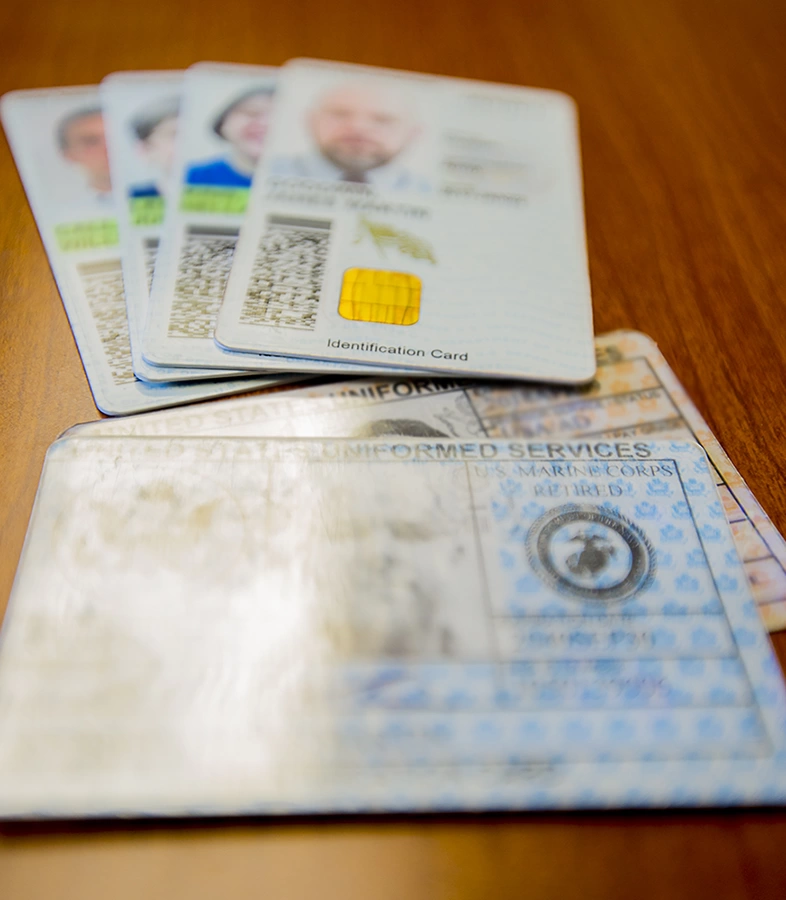Am I Required to Carry a Veteran ID Card?
When you retire or separate from the military, one of the requirements is that you either surrender or no longer use your active duty, Guard, or Reserve military ID card.
Since a military ID is used to gain access to military bases and other facilities open to service members but not the general public, having a specific expiration date on these cards is necessary to prevent unauthorized access.
Why would you need a veteran ID card? In some cases, it’s as simple as being able to prove affiliation with the military for discounts, perks, or other special options offered to those who serve. In others, some form of veteran ID may be required to access VA services, benefits, etc.
There are many types of cards considered “veteran ID cards” but one is specifically named as such. What is the difference? We’ll explore that below.
Do all Veterans Have Military ID?
As mentioned above, there are many forms of veteran ID so it’s possible to have one or more types. But for official purposes (VA clinic visits, base access, etc.) you will need specific types of ID.
A military retiree is issued an ID card that provides them access to the services and locations open to retirees. Veterans who did not retire aren’t allowed the same access on base or on-post, and the ID cards they do carry don’t guarantee access to all services or areas.
How do I get Proof of Being a Veteran?
The most important type of proof isn’t an ID card, but your military discharge document such as a DD Form 214 or its equivalent. This document is needed to request other forms of veteran ID like a state ID or driver’s license that has a veteran designation on it.
>>Military benefits for veterans and retirees
Types of Veteran ID cards
The cards described below are a combination of cards that you need to access services and bases, and the types of cards you use to access discounts and other veteran perks.
Department of Defense Identification Card
A Department of Defense (DoD) Identification Card is proof of your current military status, whether that is as an active duty member, retiree, or another category.
This card is offered to veterans including those who receive “retainer pay” and those who are VA rated with a 100% service-connected disability. Having this card offers access to programs and services you cannot obtain without one. You may be able to use this card as an ID for some TRICARE services, depending on the circumstances.
VA.gov offers a list of those eligible to apply for this card:
- Military retirees
- Those on active duty
- National Guard members
- Reservists
- Members of the Inactive Ready Reserve
Read more: TRICARE Benefits for Active Duty Military Retirees
Veteran Health Identification Card (VHIC)
Veterans who enroll in VA health care are offered a Veteran Health Identification Card (VHIC) which is used to check in to VA medical appointments with, as a form of veteran ID to get discounts and special offers, or as a backup ID when requesting veteran-specific services or options like a veteran-designated license plate.
You cannot get this card without being enrolled in the VA healthcare system. You can use the AccessVA portal to make your request, which must be accessed via Login.gov, ID.me, DS Logon, My HealtheVet, or Department of Defense Common Access Card (CAC) accounts. When submitting online, be sure to have digital copies of all required documents.
Veteran ID Card (VIC)
VA.gov describes the Veteran ID Card as a “digital photo ID you can use to get discounts for Veterans at many stores, businesses, and restaurants.” This card is not typically used for access to VA services or military bases, and is issued by the Department of Veterans Affairs. To qualify, both of these must apply:
- You served on active duty, as a Reservist, in the National Guard, or the Coast Guard and
- You received an honorable or general discharge under honorable conditions
Apply for a Veteran ID Card online using ID.me, Login.gov, or MyHealtheVet.
Veteran Designation on State-Issued Driver’s Licenses and State IDs
Va.gov reports that all 50 states and Puerto Rico offer licenses and state ID cards featuring veteran designations. Application procedures and general requirements will vary from state to state, but in general expect to bring proof of military service, discharge paperwork, and documents that prove state residency.

